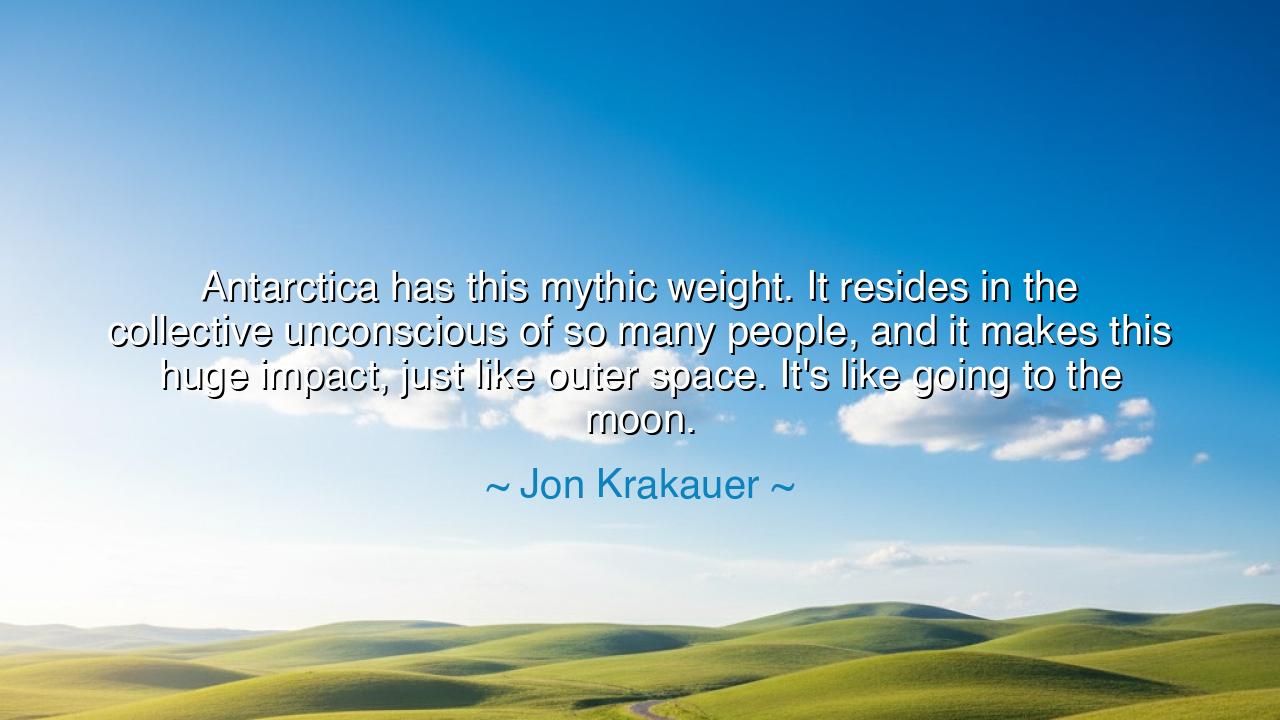
Antarctica has this mythic weight. It resides in the collective
Antarctica has this mythic weight. It resides in the collective unconscious of so many people, and it makes this huge impact, just like outer space. It's like going to the moon.






Hear the words of Jon Krakauer, chronicler of mountains and man’s ceaseless hunger for the unknown: “Antarctica has this mythic weight. It resides in the collective unconscious of so many people, and it makes this huge impact, just like outer space. It’s like going to the moon.” In this saying he draws a bridge between the frozen silence of the earth’s southern pole and the vast emptiness of the heavens. Both are frontiers where the human spirit confronts its own smallness, yet also discovers its strength. Both carry a mythic weight, for they are not merely places on a map, but symbols lodged deep within the imagination of mankind.
The origin of this thought lies in humanity’s age-old fascination with extremes. Krakauer, himself no stranger to perilous journeys, understood that certain landscapes—Everest, the poles, the deserts—call to us not simply for exploration, but for meaning. Antarctica, uninhabitable, untamed, untouched by the hand of ordinary civilization, stands in the modern age as one of the last pure frontiers. Like outer space, it is a realm where survival itself becomes a victory, where every step is both physical and symbolic. To enter such a place is to cross into myth, where human daring meets the infinite silence of nature.
Consider the story of Ernest Shackleton and his crew aboard the Endurance. Trapped in the pack ice of the Weddell Sea, their ship crushed, they endured months of unimaginable hardship. Yet Shackleton’s leadership brought them all home alive. This saga is retold endlessly, not merely for the feats of endurance, but because it resonates with that mythic weight Krakauer speaks of. It is not just about Antarctica as a continent—it is about Antarctica as a mirror of the human will, a stage upon which the drama of courage and survival is played at its highest pitch.
So too, when humankind first set foot on the moon, the triumph was not merely scientific. It was spiritual, mythic, universal. The barren surface of the moon, like the frozen plains of Antarctica, became a canvas upon which humanity projected its longings for transcendence. These frontiers remind us that we are creatures who yearn to go beyond, to test limits, to find meaning in what lies just out of reach. They are places where the earth-bound soul brushes against eternity.
The emotional force of Krakauer’s words lies in his recognition that such landscapes dwell in the collective unconscious. Even those who have never set foot upon the ice or looked upon the stars feel the weight of these places in their imaginations. They are part of our shared mythology, our modern equivalents of Olympus or Eden, realms that awaken awe, fear, and wonder. They remind us that despite our machines and our cities, we remain children of mystery, still capable of reverence before the vast and the unknown.
The lesson for us is luminous: seek not only comfort and familiarity, but also the frontiers that stir the soul. You may never walk across Antarctica or voyage into space, but you can still answer their call in your own life. They are symbols of every challenge that seems impossible, every silence that demands courage, every unknown that dares you to step forward. To face such challenges is to live mythically, to write your own chapter in the great story of humanity’s striving.
So let your practice be this: do not shy away from the “Antarcticas” of your own life—the icy trials, the forbidding tasks, the journeys that seem too vast. See them not as obstacles but as invitations to grow. And when fear whispers that such ventures are too great, remember the explorers, the astronauts, the climbers, who answered the call and transformed the impossible into legend. For as Krakauer reminds us, these realms are not only out there in the world; they are within us. To step into them is to carry the weight of myth, and in that weight, to discover the measure of your own soul.






AAdministratorAdministrator
Welcome, honored guests. Please leave a comment, we will respond soon